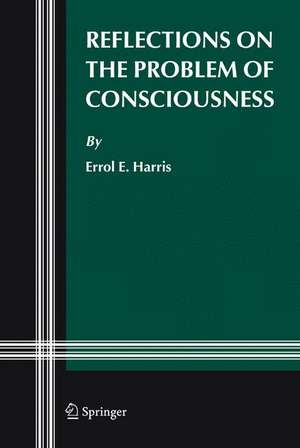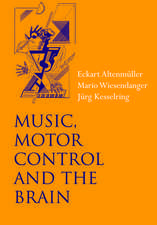Reflections on the Problem of Consciousness: Studies in Brain and Mind, cartea 3
Autor Errol E. Harrisen Limba Engleză Hardback – 12 ian 2006
| Toate formatele și edițiile | Preț | Express |
|---|---|---|
| Paperback (1) | 635.65 lei 43-57 zile | |
| SPRINGER NETHERLANDS – 30 noi 2010 | 635.65 lei 43-57 zile | |
| Hardback (1) | 641.85 lei 43-57 zile | |
| SPRINGER NETHERLANDS – 12 ian 2006 | 641.85 lei 43-57 zile |
Din seria Studies in Brain and Mind
-
 Preț: 391.22 lei
Preț: 391.22 lei - 15%
 Preț: 645.96 lei
Preț: 645.96 lei - 15%
 Preț: 583.61 lei
Preț: 583.61 lei - 24%
 Preț: 686.50 lei
Preț: 686.50 lei - 15%
 Preț: 699.77 lei
Preț: 699.77 lei - 15%
 Preț: 707.96 lei
Preț: 707.96 lei - 15%
 Preț: 645.47 lei
Preț: 645.47 lei - 15%
 Preț: 643.99 lei
Preț: 643.99 lei -
 Preț: 390.08 lei
Preț: 390.08 lei - 20%
 Preț: 554.04 lei
Preț: 554.04 lei - 15%
 Preț: 578.05 lei
Preț: 578.05 lei - 18%
 Preț: 791.40 lei
Preț: 791.40 lei - 18%
 Preț: 777.03 lei
Preț: 777.03 lei - 15%
 Preț: 646.94 lei
Preț: 646.94 lei - 15%
 Preț: 691.91 lei
Preț: 691.91 lei - 15%
 Preț: 698.80 lei
Preț: 698.80 lei - 18%
 Preț: 1118.45 lei
Preț: 1118.45 lei - 15%
 Preț: 639.25 lei
Preț: 639.25 lei - 15%
 Preț: 662.80 lei
Preț: 662.80 lei -
 Preț: 392.21 lei
Preț: 392.21 lei -
 Preț: 394.71 lei
Preț: 394.71 lei -
 Preț: 394.51 lei
Preț: 394.51 lei
Preț: 641.85 lei
Preț vechi: 755.13 lei
-15% Nou
Puncte Express: 963
Preț estimativ în valută:
122.83€ • 127.46$ • 102.67£
122.83€ • 127.46$ • 102.67£
Carte tipărită la comandă
Livrare economică 17-31 martie
Preluare comenzi: 021 569.72.76
Specificații
ISBN-13: 9781402043093
ISBN-10: 1402043090
Pagini: 186
Ilustrații: XII, 186 p.
Dimensiuni: 155 x 235 x 13 mm
Greutate: 0.46 kg
Ediția:2006
Editura: SPRINGER NETHERLANDS
Colecția Springer
Seria Studies in Brain and Mind
Locul publicării:Dordrecht, Netherlands
ISBN-10: 1402043090
Pagini: 186
Ilustrații: XII, 186 p.
Dimensiuni: 155 x 235 x 13 mm
Greutate: 0.46 kg
Ediția:2006
Editura: SPRINGER NETHERLANDS
Colecția Springer
Seria Studies in Brain and Mind
Locul publicării:Dordrecht, Netherlands
Public țintă
ResearchCuprins
The Crucial Question - Mind, Brain and Body.- Dennett and Descartes.- A Natural Method.- Descartes' Error and Spinoza's Truth.- The Dynamic Brain.- Guidance from Past Insights.- The Conditions of Consciousness.- Who or What Thinks?.- Towards a Solution.
Recenzii
From the reviews:
"This book makes distinctive and rare contributions to philosophy of mind. The most significant and unusual virtue of this book is its range, combining a deep knowledge of the history of philosophy with critiques of contemporary works in philosophy of mind and the sciences of cognition. There are a few writers who have pursued a dialog between contemporary philosophy of mind/cognitive science and Contintental philosophers such as Husserl, Heidegger and Merleau-Ponty and Pragmatists such as William James. Harris is unique, in my experience, in bringing to bear additional insights from such fixtures in the philosophical canon as Aristotle, Spinoza, Hegel, Bradley and Collingwood alongside such contemporary spokespersons of cognitive science as Antonio Damasio and Daniel Dennett. For those us of us who think that those who ignore the lessons of philosophical history may be condemned to repeat them, this book may prove an important challenge." (Steven Horst, Chair of Philosophy, Wesleyan University, CT, USA)
"Every library should be in possession of this engaging and delightful book. Anyone interested in the problems of the philosophy of mind, both scholars and layman alike, will find this insightful book both highly rewarding and a joy to read."
(Samuel Attard, Department of Philosophy, St. John's College, New York, USA)
"This book makes distinctive and rare contributions to philosophy of mind. The most significant and unusual virtue of this book is its range, combining a deep knowledge of the history of philosophy with critiques of contemporary works in philosophy of mind and the sciences of cognition. There are a few writers who have pursued a dialog between contemporary philosophy of mind/cognitive science and Contintental philosophers such as Husserl, Heidegger and Merleau-Ponty and Pragmatists such as William James. Harris is unique, in my experience, in bringing to bear additional insights from such fixtures in the philosophical canon as Aristotle, Spinoza, Hegel, Bradley and Collingwood alongside such contemporary spokespersons of cognitive science as Antonio Damasio and Daniel Dennett. For those us of us who think that those who ignore the lessons of philosophical history may be condemned to repeat them, this book may prove an important challenge." (Steven Horst, Chair of Philosophy, Wesleyan University, CT, USA)
"Every library should be in possession of this engaging and delightful book. Anyone interested in the problems of the philosophy of mind, both scholars and layman alike, will find this insightful book both highly rewarding and a joy to read."
(Samuel Attard, Department of Philosophy, St. John's College, New York, USA)
Textul de pe ultima copertă
The essential and most puzzling problem of consciousness is how the electro-chemical activity constantly occurring in the brain translates into the conscious experience we enjoy. Neither neuro-scientists nor psychologists nor philosophers have so much as tackled this problem head-on, (despite many claims to the contrary ) let alone solved it. In this study, Errol Harris considers the attempts that have been made by several important neuro-scientists and philosophers to address the question, and he makes his own suggestions as to how it might be approached with the best prospect of intelligibility.
"This book makes distinctive and rare contributions to philosophy of mind. The most significant and unusual virtue of this book is its range, combining a deep knowledge of the history of philosophy with critiques of contemporary works in philosophy of mind and the sciences of cognition. There are a few writers who have pursued a dialog between contemporary philosophy of mind/cognitive science and Contintental philosophers such as Husserl, Heidegger and Merleau-Ponty and Pragmatists such as William James. Harris is unique, in my experience, in bringing to bear additional insights from such fixtures in the philosophical canon as Aristotle, Spinoza, Hegel, Bradley and Collingwood alongside such contemporary spokespersons of cognitive science as Antonio Damasio and Daniel Dennett. For those us of us who think that those who ignore the lessons of philosophical history may be condemned to repeat them, this book may prove an important challenge." Steven Horst, Chair of Philosophy, Wesleyan University (CT, USA)
"This book makes distinctive and rare contributions to philosophy of mind. The most significant and unusual virtue of this book is its range, combining a deep knowledge of the history of philosophy with critiques of contemporary works in philosophy of mind and the sciences of cognition. There are a few writers who have pursued a dialog between contemporary philosophy of mind/cognitive science and Contintental philosophers such as Husserl, Heidegger and Merleau-Ponty and Pragmatists such as William James. Harris is unique, in my experience, in bringing to bear additional insights from such fixtures in the philosophical canon as Aristotle, Spinoza, Hegel, Bradley and Collingwood alongside such contemporary spokespersons of cognitive science as Antonio Damasio and Daniel Dennett. For those us of us who think that those who ignore the lessons of philosophical history may be condemned to repeat them, this book may prove an important challenge." Steven Horst, Chair of Philosophy, Wesleyan University (CT, USA)
Caracteristici
Tackles a philosophical problem which (apart from a few instances in the history of philosophy) has not been dealt with before Examines and dismisses several claims that have been made to solve the problem of consciousness

















